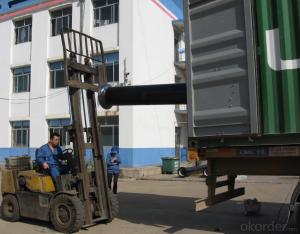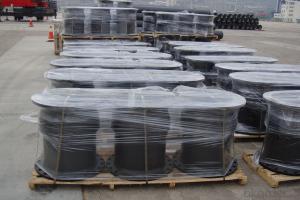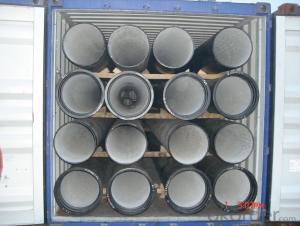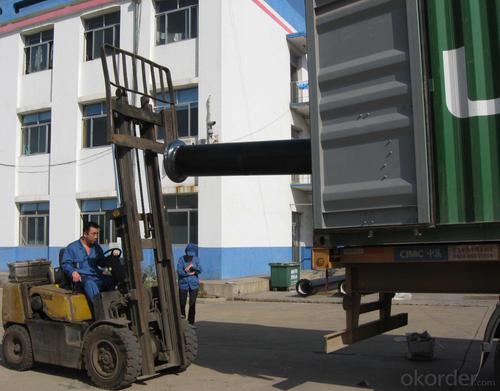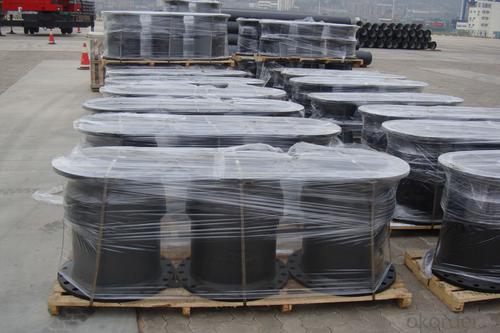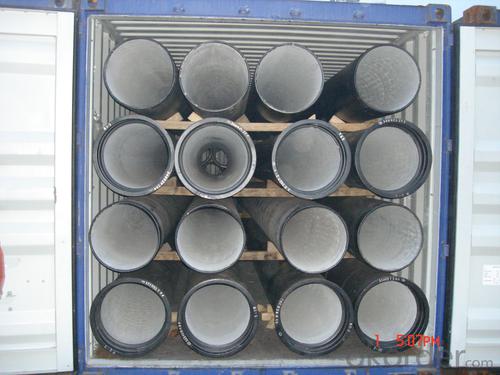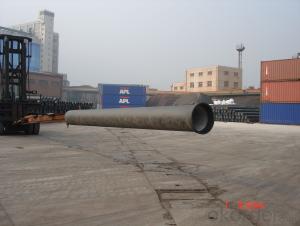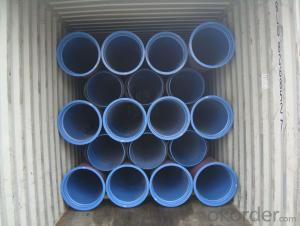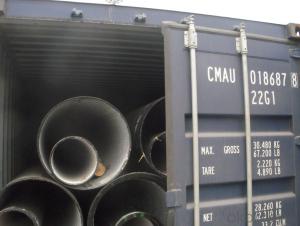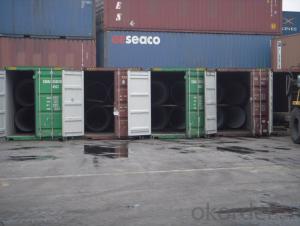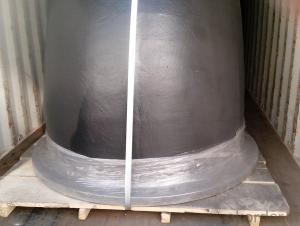DUCTILE IRON PIPES C Class DN1000
- Loading Port:
- China Main Port
- Payment Terms:
- TT OR LC
- Min Order Qty:
- -
- Supply Capability:
- -
OKorder Service Pledge
OKorder Financial Service
You Might Also Like
Ductile Iron Cast Pipe is without any defects compare with tradition casting tech, which has many advantages particularly as follow:
(1) High density. In the "vertical upward casting" process, the melt iron of centre liquid column in center crystallizer is continuously feeding for volume shrinkage caused by condensation tube at outer circumference , which lead to be free of shrinkage porosity.
(2) High purity. When melt iron pouring, the mixed impurities such as gas, dross, sand grain which are lighter than melt iron could be eliminated at furnace mouth, its impossible to enter into the crystallizer through the channel, so the melt iron into the crystallizer is very pure.
(3) Strength with toughness. The cooling speed provided by continuous crystallizer is 30 times than sand casting and 5 times than centrifugal casting, and doesn't produce white iron, the eutectic cell volume of continuous cast iron is one eighth to one tenth compare with traditional cast iron. The density of graphite nodule in ductile iron can reach 300-700 pcs/mm2. Therefore, all reason above improve the strength and toughness of continuous cast iron.
(4) Free machining. The high speed cooling make the hardening phase (such as boride, steadite) not appear like reticular, massive or thick, but diffuse like fish bone and pane in shape, moreover, there are tiny graphite flakes inlaid hardening phase. It's free machining in BrinellHardness the range of 250-300HB. However, the Brinell Hardness of 250 is top limit to common metal materials.
(5) Uniform composition of tube wall. The convection mixing of liquid column caused by marching type drawing in crystallizer make the composition of tube wall well-distributed, and concentration gradient very little.
(6) High productivity. To the wall thickness of tube under 10mm, the speed of continuous casting is 1 meter/min, to the wall thickness of tube under 20mm, the speed of continuous casting is 0.5 meter/min, which is high efficiency that centrifugal or other casting tech couldn't reach.
- Q: Can ductile iron pipes be used for mining applications?
- Mining applications can indeed utilize ductile iron pipes. These pipes possess exceptional mechanical properties, including high tensile strength, impact resistance, and durability. As a result, they are well-suited for a range of challenging environments, including mining operations. The pipes are capable of withstanding substantial loads and pressures, making them ideal for the transportation of water, slurry, and other fluids utilized in mining processes. Moreover, ductile iron pipes have a smooth internal surface that minimizes friction and promotes the efficient flow of materials. Consequently, they find extensive use in tasks such as dewatering, tailings disposal, and the transport of corrosive or abrasive substances within the mining industry. Overall, due to their strength, durability, and suitability for demanding conditions, ductile iron pipes offer a dependable and cost-effective choice for mining applications.
- Q: What is the weight of ductile iron pipes compared to other materials?
- Compared to other commonly used materials in the construction industry, ductile iron pipes tend to be heavier. The weight of these pipes can vary depending on their specific size and dimensions, but they are usually heavier than materials like PVC, HDPE, and steel pipes. The primary reason for this increased weight is the dense nature of ductile iron, which grants it durability, strength, and resistance to corrosion. However, this weight also presents challenges in terms of transportation, installation, and handling, necessitating appropriate equipment and techniques for safe and efficient installation. Despite being heavier, ductile iron pipes offer numerous advantages in terms of longevity and performance in various applications.
- Q: Do ductile iron pipes require additional protection against external factors?
- Yes, ductile iron pipes do require additional protection against external factors. While ductile iron is known for its strength and durability, it is still susceptible to corrosion and other external threats that can lead to pipe failure. One of the main external factors that ductile iron pipes need protection from is corrosion. Corrosion can occur due to the presence of certain chemicals in soil or water, and it can weaken the pipe over time. To protect against corrosion, ductile iron pipes are often coated with an external protective layer such as polyethylene or zinc. This coating acts as a barrier between the pipe and the corrosive elements, extending the lifespan of the pipe. In addition to corrosion, ductile iron pipes may also require protection against physical damage. These pipes are typically buried underground, making them vulnerable to external forces such as heavy machinery, ground movement, or even vandalism. To safeguard against physical damage, ductile iron pipes can be encased in concrete or surrounded by a protective sleeve or casing. Furthermore, ductile iron pipes may need protection against soil conditions that could potentially cause pipe movement or shifting. In areas with unstable soil, additional measures such as proper bedding and backfilling techniques, as well as the use of anchoring devices, may be necessary to ensure the stability and integrity of the pipes. In summary, while ductile iron pipes are robust, they still require additional protection against external factors. This can include corrosion protection, physical damage prevention, and measures to address soil conditions. By implementing these protective measures, the lifespan and performance of ductile iron pipes can be significantly extended, ensuring the reliable conveyance of water and other fluids.
- Q: What is the expected service life of ductile iron pipe?
- The expected service life of ductile iron pipe can vary depending on various factors such as the environment, soil conditions, water quality, and the level of maintenance and corrosion protection measures implemented. However, on average, ductile iron pipe is designed to have a service life of 75 to 100 years. This is due to its superior strength, durability, and resistance to corrosion. Ductile iron pipe is known for its ability to withstand harsh conditions and has been used extensively in water and wastewater systems, industrial applications, and other infrastructure projects. Regular maintenance and proper corrosion protection can further extend the service life of ductile iron pipe, ensuring its continued reliability and performance over many decades.
- Q: Luo what effect of ductile cast iron
- It should be chromium, chromium is anti graphitization elements in ductile iron if the content for a long time, will hinder the graphitization of cast iron, the iron cementite microstructure (Fe3C) content increased, the chilling tendency of the cast iron increases, will make iron brittle, hard, affect the mechanical properties and processing properties of nodular cast iron.
- Q: How are ductile iron pipes protected against root intrusion?
- Diverse techniques and methods exist to safeguard ductile iron pipes from root intrusion. The application of root inhibitors or growth regulators is a commonly employed approach. These substances are typically injected into the surrounding soil, forming a barrier that restricts root growth near the pipes. This effectively prevents roots from penetrating the pipes and causing damage. Another method involves the utilization of physical barriers like root barriers or sleeves. These barriers are installed around the pipes to physically obstruct root access. Root barriers are typically constructed from materials such as plastic or metal, engineered to withstand the pressure exerted by growing roots. In addition, regular maintenance practices like periodic inspections and cleaning play a crucial role in preventing root intrusion. By consistently monitoring pipe conditions and removing any existing root masses, the risk of further intrusion can be minimized. It is important to recognize that preventative measures are more effective than reactive measures in protecting ductile iron pipes from root intrusion. Therefore, implementing proactive strategies during the installation phase, such as proper pipe bedding and alignment, can significantly reduce the likelihood of intrusion. Overall, a combination of chemical treatments, physical barriers, and appropriate maintenance practices greatly enhances the protection of ductile iron pipes against root intrusion, ensuring their long-term durability and functionality.
- Q: Can the sealing ring of ductile iron pipe be reused?
- The sealing ring is hard to install and take off. I have been in this line for six years. I haven't seen it removed. The rubber ring itself is not expensive. It is not necessary to reuse it.
- Q: How can the old water pipe ductile iron pipe be opened with three flanges?
- Cast iron pipe is not good then did not take the treatment is not good in the local search do you master plumbing to the scene to see the actual situation, some teachers have you unexpected strain interpretation way.
- Q: How are ductile iron pipes inspected for quality control?
- Ductile iron pipes are inspected for quality control through a series of rigorous tests and inspections to ensure their compliance with industry standards. One of the most common methods used is visual inspection, where trained inspectors examine the pipes for any visible defects such as cracks, pits, or surface irregularities. This helps in identifying any visual defects that may compromise the overall quality of the pipes. In addition to visual inspection, another crucial quality control measure is dimensional inspection. This involves measuring the dimensions of the pipes, such as diameter, wall thickness, and length, using specialized tools and equipment. By comparing these measurements against the specified tolerances, any deviations can be identified, and necessary corrective actions can be taken. Another important quality control step is hydrostatic pressure testing. In this test, the pipes are subjected to internal pressure that is higher than their intended operating pressure. This ensures that the pipes can withstand the required pressure without any leakage or failure. The test involves filling the pipes with water and gradually increasing the pressure, while closely monitoring for any signs of leakage or deformation. Furthermore, ductile iron pipes undergo various mechanical tests, such as tensile strength testing and impact testing, to evaluate their mechanical properties. These tests involve applying controlled forces or impacts to the pipes and measuring their response. By doing so, the strength, toughness, and durability of the pipes can be assessed, ensuring they meet the necessary requirements. Lastly, metallurgical examinations are conducted to analyze the microstructure of the ductile iron pipes. This involves taking samples from the pipes and using microscopy techniques to examine the grain structure, phase distribution, and any potential defects at a microscopic level. This helps in identifying any issues that may not be visible to the naked eye but could affect the overall quality of the pipes. Overall, the inspection process for ductile iron pipes involves a combination of visual, dimensional, hydrostatic, mechanical, and metallurgical tests. These quality control measures help ensure that the pipes meet the required standards, providing reliable and durable infrastructure for various applications.
- Q: Can ductile iron pipes be used for fire protection systems?
- Yes, ductile iron pipes can be used for fire protection systems. Ductile iron pipes have excellent strength and durability, making them suitable for carrying water and withstanding the pressure required in fire protection systems. Additionally, they have good corrosion resistance, which is crucial for long-term use in fire protection applications.
Send your message to us
DUCTILE IRON PIPES C Class DN1000
- Loading Port:
- China Main Port
- Payment Terms:
- TT OR LC
- Min Order Qty:
- -
- Supply Capability:
- -
OKorder Service Pledge
OKorder Financial Service
Similar products
Hot products
Hot Searches
Related keywords
